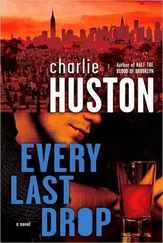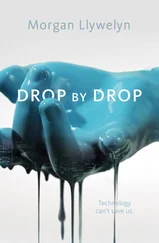Then there was hilarity, the kind of unbridled, unself-conscious, rollicking, full-bore, take-no-prisoners hilarity that only a bush town sunk deep in its ruts could generate. Somebody had a guitar, somebody else a fiddle. A banjo appeared. A washboard. There was dancing, drinking, eating, the cake dwindled through its layers and disappeared in a pale picked-over detritus of frosting and crumbs, the steaks and ribs fell away to fragments of gnawed bone, bottles went clear and gave up the ghost. She stood there beside Sess, her arm round his waist, drinking river-cooled champagne out of a plastic cup, while people she didn't know came up and talked in her face and she thanked them for their gifts of smoked sheefish, nasturtium seeds, fish gaffs and motor oil, and the more practical things too, like a fifty-pound sack of cornmeal and a nightie the size of three slices of bread cobbled together.
“Sess, I know you're the outdoors type,” her mother was saying, “just like my Victor, but that doesn't mean you have to be out traipsing through the woods for days at a time while my girl lays up lonely and heartbroken in that tiny little cabin, does it? Because I worry. I do.”
“I worry too,” Sess told her with an even smile, “but you can bury any fears you might have on your daughter's account…” He was about to drop her mother's name into the void at the end of this little declaration, but Pamela could see he didn't know quite what to call her yet, whether “Mom” would float or if he should fall back on “Mariette” or “Mrs. McCoon” or maybe just clear his throat instead. That was cute, that little glitch. It was endearing. And Pamela was right there with him, heart and soul, tucked in under his arm like a text he hadn't read yet but meant to get to directly, and she hadn't stopped smiling since she'd woken up this morning.
“My wife's going to have plenty to keep her occupied,” Sess said, a hint of slyness creeping into his voice, “what with skinning out carcasses, tanning hides, hauling ice up out of the river for water, cutting wood for the stove, sewing, mending, feeding the dogs-feeding me, for that matter. Isn't that what wives are for?”
Her mother had been drinking vodka for three hours. The sun pounded at her face, beat cruelly at the thin flaps of skin the plastic surgeon in Tempe had worked like hide over her cheekbones and firmed round the orbits of her eyes. She gave a little laugh and took Sess's other arm, the free one, and leaned into him. “If you ask me,” she said, and she paused for effect, “a woman needs to be good, really good, at one thing only-”
Sess colored, and her mother, enjoying herself, went on: “And I don't think I have to tell a grown man like you just what that might be, now do I, Sess?”
That was when Pris, in the middle of the crush of dancers, let out a whoop and they all three turned their heads to see her in the grip of something uncontainable, a romping flailing black-headed blur of motion that might have been a bear going for her throat but wasn't. It took Pamela a minute to understand, because she was new here and she was caught up in the whirl of her own drama: Joe Bosky had crashed the party. He was wearing an old faded military shirt and the blue jeans that were a second skin to him, and he was flapping his feet like a spastic and leaning in to twirl Pris under the eggbeater of his right arm. And Pris, pretty in lavender satin and with her hair piled up atop her head, had no idea who he was or what his motives might have been or that he was the sole resident of the town and its environs who was here uninvited. Expressly uninvited. Adamantly uninvited. She had that wild look on her face that Pamela knew only too well, the cigarette look, the vodka look, the look that said the party had only just begun and there was no stopping her now. Joe Bosky brought her to his chest, spun her away, pulled her in close again. “Yee-ha!” she shrieked, and you could hear the piping breathless cry over the clash of the band like the mating call of some exotic bird.
Pamela felt Sess stiffen. Her mother said, “Looks like my youngest is not to be denied either. But I don't like her hair up like that. Do you like her hair up, Pamela?”
Pamela didn't answer. Her arm was thrust through her husband's-my _husband,__ she was thinking, my _husband's__ arm-and she was the stake in the ground, she was the chain, because there was going to be no violence on her wedding day, not today, no. “Sess,” she warned him, “Sess,” and then she moved flush into him and wrapped him up in her arms. “I want to dance, Sess,” she said. “Come on. Let's dance.”
But then she was jostled from behind and a man she didn't recognize-fisherman's hat with an eagle feather thrust up out of the band, frayed blue dress shirt, beard, yeast breath, hair growing out of his ears-wrapped them both up in a titanic embrace and just squeezed and rocked. “Sess!” he shouted in her ear. “Pamela! Congratulations! Many happy returns! Et cetera, et cetera!”
“Ogden,” Sess said, and she could feel him pulling back, trying to get loose, trying to get to the blood-spilling part of the ceremony. Pris let out another shout. Ogden tightened his grip, and then Pamela understood.
“We'll take care of it,” he said in a voice that rasped like the hull of a skiff plowing over a sandbar, “me and Richard and Iron Steve. Relax. Okay? Just relax.” And then he let go and he was gone, wading through the crowd of dancers on a collision course with Pris and Joe Bosky. She saw a tall, big-headed man closing in on them from one side, and Richard Schrader, looking grim, from the other. “Son of a bitch,” Sess spat, and still she held him. “Son of a fucking bitch.”
“Well, what-?” her mother began, her smile uncertain. “You sure do have enthusiastic friends, Sess-I thought he was going to crush the two of you-”
Joe Bosky was oblivious, or at least he pretended to be. She couldn't help watching-couldn't take her eyes from him-as he whirled and shimmied and flung Pris around as if he were one of the teen heartthrobs on _American Bandstand,__ all style, all limbs, his eyes bugging and hips thrusting. And Pris. She was lit up-here was the kind of man she'd been looking for, his quotient of animal spirits so far above the average you couldn't begin to put a cap on them. She made two moves for his every one, the gown riding up under her arms, her hair coming down in a slow soft tumble. All in fun. All in good fun. Except that the man was Sess's enemy, here to spoil the day, and make no mistake about it.
The tall man with the big head-Iron Steve, she presumed-caught Bosky under the arms as he rocked back from Pris's white-knuckled grip, and then Richard and Ogden Stump converged on him like tacklers on a football field. She watched his features draw down in surprise, a heartbeat's respite, Pris's empty hand and awakening face, and then he seemed to detonate. He flung himself in four directions at once, screaming like a woman, a long tailing high-pitched shriek that had nothing but fakery and hate in it, and then the four of them were rolling around in the weeds and the mud, good clothes spoiled, the crowd giving way and the band freezing out the chorus of Hank Williams's “Cold, Cold Heart.”
In two minutes it was over, black-headed Joe Bosky trussed in arms and Iron Steve's elbow pinned to his throat, the eight-legged walk to the verge of the property and the necessary threats and imprecations hurled back and forth, the band lurching again into the defeated chorus and Sess's eyes gone cold as a killer's. “Good God, Sess,” her mother was saying, “but you've got some excitable friends. Too much to drink, I guess”-with a laugh-“or maybe Pris was too much for him to handle. My daughters are like that, you know.”
And here came Pris, flustered, blotched, her hair a mess and the hem of her dress stiff with mud. “What was that all about?” she said, extracting a cigarette from her purse. “I was just starting to warm up there. Who was that guy, anyway-an escapee from the mental ward or something? I mean, I kind of liked him. His spirit, I mean.”
Читать дальше












